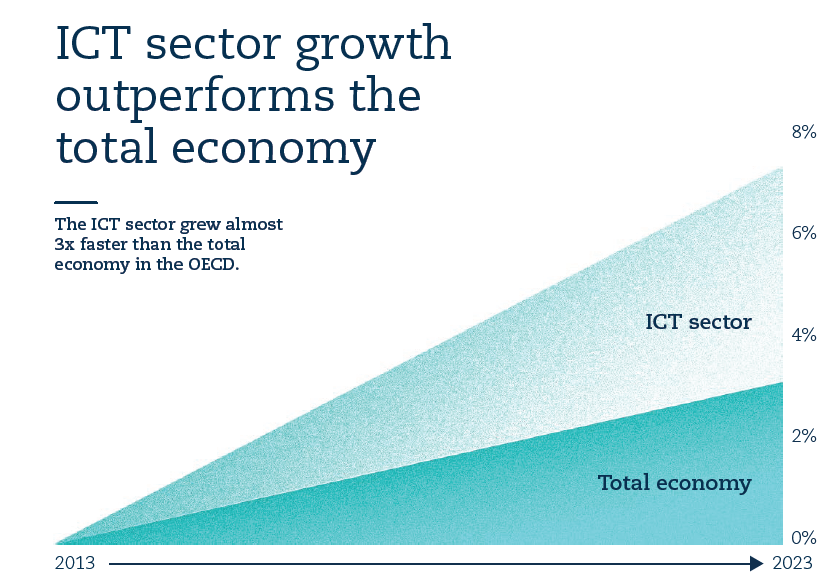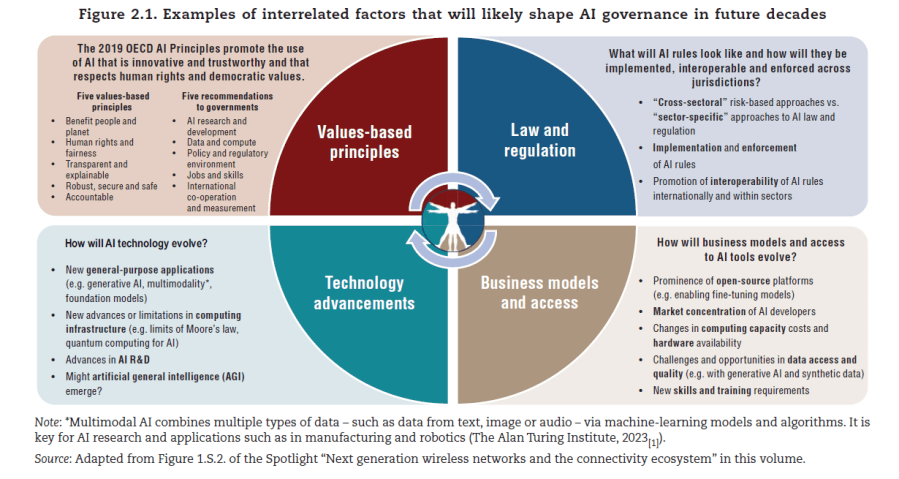The rapid advancement of interdependent digital technologies is driving significant economic and societal transformations. The OECD Digital Economy Outlook 2024 (Volume 1) provides an in-depth look at the fast-paced advancements in digital technologies that are reshaping our economy and society, underpinning digital transformation and their impacts.
ICT continues to grow at a dynamic pace
Volume 1 uses big data and machine-learning techniques to estimate the growth rate of the ICT sector, which remains the core of the digital economy. Over the past decade, the ICT sector has grown approximately three times faster than the total economy in OECD countries, reaching an average growth rate of 7.6% in 2023. This highlights the sector’s resilience and importance.

As digital transformation intensifies and their social and economic impact deepens, the need for evidence-based policies becomes more urgent. The OECD have used Google Trends data to nowcast trade in services during the COVID-19 period and to develop weekly estimates of GDP growth rates. Additionally, the OECD AI Policy Observatory uses non-traditional data to measure the real-time use and diffusion of AI technologies. However, the extent of digital transformation is difficult to measure in terms of the monetary value of the digital economy due to a lack of timely and comparable data across countries.
Therefore, we believe that OECD and its member states should make more efforts to provide common measuring approaches and key performance indicators (KPIs) to inform effective policymaking and strategy development.
AI: a game-changer in a fully transformed game
In the realm of artificial intelligence (AI), the OECD report highlights that recent advancements have led to the development of generative AI so sophisticated that distinguishing between human and AI-generated content has become challenging. This progress underscores the need for collaborative efforts among policymakers, developers, and researchers to navigate AI’s evolving landscape effectively.
Looking ahead, the OECD highlights the fact that AI holds the promise of significant socio-economic benefits such as enhanced productivity and scientific progress, yet it also poses substantial risks, including the spread of misinformation and threats to human rights. Despite market fluctuations, AI research, development, and venture capital investments are on the rise globally, with China emerging as a leader in AI research and generative AI attracting increasing investment. However, access to computing infrastructure remains a crucial factor influencing AI development, contributing to compute divides within and between countries.
In our view, given the global impact of AI, international cooperation is essential to ensure that AI policies and regulations are effective and aligned across borders. As AI continues to shape our future, fostering collaboration and responsible deployment will be key to maximizing its potential for positive impact while mitigating associated risks.
The OECD present some examples on how will likely be shape the AI governance in future decades:

Telecom companies are actively engaging in shaping these policies and standards at national and global level. At the same time telecom operators are developing and implementing robust ethical guidelines and governance models for AI use to prevent misuse and respect users’ rights and the environment. This is allowing us to establish comprehensive risk management strategies to address the potential socio-economic impacts and security vulnerabilities associated with AI.
Next generation wireless networks and the connectivity ecosystem
The DEO 2024 chapter on Next Generation Wireless Networks and the Connectivity Ecosystem analyses the emerging trends that are shaping the landscape of connectivity. It explores the trajectory of next-generation wireless technologies and the challenges they present in becoming commercially viable and universally accessible.
The chapter delves into research initiatives, market dynamics, and advancements aimed at integrating terrestrial wireless solutions like 5G and 6G with non-terrestrial technologies such as satellites and aerial platforms. By examining these developments, it highlights the complexities surrounding spectrum policy, regulatory collaboration, interoperability, environmental sustainability, safety, digital security, and bridging digital divides. Addressing these technical and regulatory challenges is crucial for realizing the future visions of seamless connectivity and ubiquitous access to next-generation wireless networks.
The OECD highlights that the concept of hybrid topology wireless networks, integrating terrestrial and non-terrestrial networks, relies on the convergence of three key elements: a growing demand for data in the aviation sector, an evolving satellite sector seeking new applications, and the terrestrial wireless communication sector grappling with surging mobile traffic.
We believe that collaboration among policymakers is essential to address the complex market dynamics and regulatory challenges posed by the integration of diverse connectivity solutions, while ensuring digital security and bridging digital divides through the expansion of broadband infrastructure and services.
Digital technology diffusion and data
Digital technologies and data have transformed various aspects of society, offering both opportunities and challenges. As governments and businesses increasingly transition to online service provision, access to and effective use of digital technologies become crucial for ensuring equal opportunity and inclusion.
The OECD report flags the disparities in internet usage persist, particularly among different age groups, education levels, and income brackets. While the COVID-19 pandemic accelerated the uptake of certain online services, such as teleworking, not all effects may be enduring, with retail e-commerce returning to pre-pandemic levels. Additionally, while cloud computing and Internet of Things (IoT) technologies have seen rapid adoption, big data analytics and artificial intelligence (AI) remain underutilized, with AI adoption concentrated in the information and communication technology (ICT) sector.
From our view, to address these challenges and promote equitable uptake of online services and technology diffusion, governments should prioritize user-centric and inclusive online service provision while investing in digital skills development, particularly for vulnerable groups. Moreover, policies should aim to create a level playing field among firms for accessing key inputs, including data, to accelerate technology diffusion and harness the full potential of digital technologies and data for inclusive and productive growth.
Virtual reality and its opportunities and risks
The emergence of three-dimensional (3D) technologies, particularly virtual reality (VR), has sparked discussions about their potential opportunities, risks, and impacts on various aspects of society. This chapter explores the realm of immersive digital environments, with a particular focus on VR due to its widespread scalability. It elucidates the technological intricacies of VR, shedding light on its benefits and opportunities as well as its downsides and risks. By examining concrete use cases, it moves beyond the hype surrounding VR, offering a realistic understanding of its utility and limitations.
OECD also underscores the importance of considering the downsides and risks of VR, including privacy concerns and safety, cognitive impacts on children, simulator sickness, and potential overuse or addiction.
Therefore, we need a balanced approach that fosters industry growth while safeguarding user privacy as VR becomes increasingly integrated into various sectors, policymakers are tasked with developing appropriate regulations and guidelines to ensure its responsible use and mitigate potential harms.
The responsible use of technology and the protection of minors
Digital environments have introduced new risks, particularly for mental health. The report examines negative behaviors such as cyberbullying, problematic internet use, and excessive social media consumption, which disproportionately affect vulnerable groups. Additionally, the spotlight examines how immersive technologies may exacerbate these issues.
As young people spend an increasing amount of time online and digital environments become more immersive, risks for society have to be mitigated. The debate on how to ensure responsible use of technology and guarantee a safe digital environment for minors is rapidly gaining relevance.
We believe that policymakers should prioritize the development of a thorough policy agenda to protect mental health in the digital era, which should involve raising awareness about negative behaviors, promoting media literacy, and advocating for safety by design in digital platforms. Collaboration among governments, businesses, and NGOs is crucial for the successful implementation of effective prevention and intervention strategies.
All in all, the OECD Digital Economic Outlook 2024 highlights the rapid advancement of interconnected digital technologies, providing new growth estimates for the ICT sector using big data and machine-learning techniques, offering insights into the future of AI as a positive force, advancements in next-generation wireless networks, digital technology diffusion and data, the opportunities and risks of virtual reality, and the impact of digital environments on mental health., which are driving significant economic and social changes.














